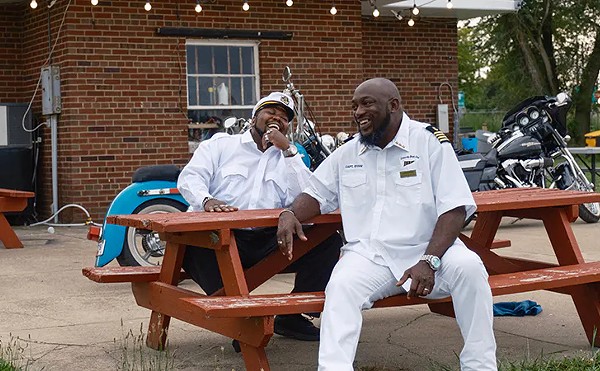In the chess world, they are enduring what's known as a "simul," an open exhibition in which anyone can sit down and challenge some of the country's best players. Today, six local masters are pitted against 140 unsuspecting amateurs in simultaneous competition. A Crocker Park gift certificate goes to anybody who upends a master.
"You can tell he's using the horses to control the center," Blue Hawaiian whispers to his wife, as if he's discovered the master's weakness. Across the aisle, a teenage girl looks sullenly at her newly fallen king. Checkmate.
Blue Hawaiian's opponent surveys each board and completes his moves in mere moments. He's slight of build, his sparse and curly dark hair fluttering with each bounce from table to table; his stolen pieces are tossed to the side like so much flotsam. He has the humility of a rodeo clown and the skin of a tangerine.
This is Calvin Blocker.
"How's my face?" he asks a bystander. "Is it still very orange? It should fade quickly."
To the scorekeepers at the Ohio Chess Association, Blocker is the state record holder in simul competition: He recently racked up 110 simultaneous wins and 6 draws -- no defeats -- at an event in Woodmere. He also dabbles in homeopathic medicine. A new topical cream, concocted in his kitchen, is still undergoing tests. Among other things, Blocker has yet to perfect the pinkish-peach tone of human skin. And so today, he is orange.
"I've put myself into toxic shock before," he says. It's hard to doubt him.
Blocker pauses for 10 seconds in front of the next board -- a veritable slumber for him. But with one move of Blocker's bishop, Blue Hawaiian is hemorrhaging.
He advances to another foe a few boards down, a fat kid with an open face and a smug grin. The boy has just countered the master rather hastily. "Think about your move the whole time I'm gone," says Blocker in a gentle voice. "You might come up with a better one." He's not so easy on adults.
Soon, the sound of kings tipping over -- clunk, clunk, clunk -- can be heard throughout the tent. Novices stand up in a daze and wander back outside. No one earned a gift certificate from this master today. But they can tell their friends they played against Calvin Blocker. And in these circles, that still means something.
At 50, Blocker is three decades removed from the prodigy label once bestowed upon him, but he remains Ohio's only native "international master"; of these, there are about 300 in all America. The United States Chess Federation has assigned him the astronomical rating of 2443, though you'd have to be a prodigy just to understand what that figure means.
"Calvin is a fascinating person," says local amateur Mikael Oet. "Calvin -- I watch his games -- he's like an artist, like a gourmet cook, and he's not going to put an extra pinch in. He's very precise about every move."
Of course, some say that was the Blocker of old, the guy who played against grand masters in world championships and hustled patzers for lunch money in Greenwich Village. But that was long ago -- before the crash, before he quit chess and seemingly everything else. Before his own dreams of being grand master passed away with the only woman he ever loved. Before making rent became his primary objective.
International Master Calvin Blocker lives in an apartment that straddles the border of Shaker Heights and Ghetto. Across from his front door is a small park, where shabby men stand by trees, nodding to passersby in a way that feels less like a greeting than a sales pitch. Dirty cars line the street, rusting into obscurity.
Blocker's living room is cluttered with boxes brimming with old chess magazines; atop one stack, his face peers out from the cover of an old Ohio Chess Bulletin. A large closet is devoted to family artifacts, including paintings rendered by his mother's able hand. A row of trophies lines one wall. He kept the bigger ones; the rest were sold for scrap when he needed some extra scratch, which is almost always.
More boxes in the bedroom, but no bed. Blocker sleeps on an uncluttered rectangle of carpet in the corner. "It helps my back," he says.
The kitchen houses perhaps his most valuable possessions. Below cabinets with dark handle stains rests his collection of vitamins and herbs: ginseng, ginkgo biloba, St. John's wort. Some of the bottles bear price stickers of more than $10. "I was experimenting with bee pollen recently," says Blocker. "I ate too much and had to go to the hospital. I put myself into anaphylactic shock."
Everything is covered in a thick layer of dust -- everything, that is, except his chessboard, conspicuous only in its ordinariness. Blocker takes a seat behind it.
Today, he's wearing a red football jersey with holes worn into the armpits. It sags beneath his gaunt frame as he leans forward. He fidgets nervously with his large tinted eyeglasses as if revving his engine. Then he begins:
"This was in the 10th round against a man named Josic from Yugoslavia. March 1980. It was an international tournament. New York. No, Philadelphia. They still talk about the match, it was so crazy. I was playing for my IM title. I didn't even need to win. A draw gives me the IM title for life. Fifteen moves into the game, Josic offers me a draw. He thought we had equal positions, but I thought I was a little stronger. I thought maybe I could win. So he brings out his hand for the draw . . . and I didn't take it. I was fearless. I might be the only person in the history of chess to turn down a draw that would have resulted in a title. I took the draw three moves later though. I'm also maybe the master who has won more chess tournaments than anyone else. But these were patzer tournaments, you know what I'm saying? Little tournaments. Most masters don't bother with them. But I played all the tournaments I could. Because I love chess. I couldn't get enough of it. So I played these patzer tournaments -- don't say that, though; that word, 'patzer,' it's not a good word. It's German. It means a weak player. So don't say it, or it will make me look conceited or something. Anyway, I probably won over a thousand tournaments. I'd be a little embarrassed if it's proved that I'm right. Did you notice that painting when you walked in? My mother drew that. It looks different when the light is turned off. Here, let me show you."
It does look different. His mother's use of sunlight hitting the robes of a monk looking out over a valley is inspired. But the painting next to it is even better. It's a three-quarter profile of a teenage boy, his eyes radiating a fierce intelligence anomalous for his age. It's Blocker at 15.
He played in his first tournament that year, shortly after a neighborhood pal introduced him to the game. In his senior year at Cleveland Heights High, his team won the national high school championship. After three and a half years studying piano at the Cleveland Institute of Music, Blocker dropped out and moved to Greenwich Village -- the better to participate in the international chess tournaments played on the coast. "I hustled," he says. "I was living with friends and hustling patzers, playing chess on the street so that I could eat and have enough money to enter tournaments. But I was honest with them. I told them that I would beat them."
His timing could not have been better. For chess wizards, New York in the '70s was the center of the universe, the front line against the enemy: the Russians.
Chess, unmistakably, is a cold war. A battle waged upon a field of 64 squares against an opponent of equal firepower. Fittingly, it hasn't been a hit in this country since the height of the Cold War, when the top American players faced off against the Soviet Union in the ultimate draw of assured mutual destruction.
For 40 years, the Russians dominated chess. So good were they that only fellow Soviets could provide adequate competition; for years, the title of world champion was swapped among their ranks. Then an American came out of nowhere and beat the Russians into submission. His name was Bobby Fischer, a kid from New York. He stunned the world by toppling Boris Spassky at the 1972 World Championships in Iceland and held the title until 1976, when he retreated into a madman's exile.
For any player to be taken seriously, he must place in tournaments sponsored by the World Chess Federation, which bestows the titles of international master, grand master, and world champion. Once master status is earned, it can never be taken away. Thus, the requirements are stringent. Ratings are based on points earned during play. More points are awarded for beating a stronger opponent. But the challenger must perform on this level for at least 27 games. According to the U.S. Chess Federation, there are only about 100 grand masters in America.
Fischer's achievement inspired young Calvin Blocker to strive for grand master, and by 1980 he was well on his way. Already an international master at 25, he bided his time, picking off lesser foes at small tournaments.
He returned to Ohio frequently to visit his mother, Lena, who had been a widow since 1978, and to catch up with his chess buddies. He became a fixture at the old Arabica on Coventry, a short walk down the street from where he grew up. That's where the gray-bearded masters congregated -- expats from Europe, who came here after the second World War.
Known for his nonstop banter, which blasts forth like machine-gun fire, Blocker would stop speaking only when he was engaged in a match. Michael Joehlson challenged him hundreds of times in that coffeehouse during the early '80s, though he won only two or three games.
"We all think Calvin has the talent to become a grand master," says Joehlson, who runs a nonprofit group called Chess-for-Success, dedicated to teaching the game to inner-city kids. "There's a number of reasons that he may not have reached the title." One of those, he says, was Blocker's lack of sponsorship. To get a crack at the big boys overseas, you need financial support to cover expenses. (Most high-ranking players, the sons of Manhattan bluebloods, are supported by their six-figure trust funds.) Blocker's only support came from his mother, a secretary at University Hospitals. She was his best friend and perhaps the main reason the rank of grand master eluded him.
In 1989, Lena Blocker suffered a massive stroke. Calvin dropped chess and returned home to care for her. She was transferred from her apartment to a nursing home, where machines enabled her to breathe and eat. Medications couldn't reverse her condition, and doctors predicted that she wouldn't last a year. So Calvin stayed at her side by day and pored over homeopathic textbooks by night, studying natural remedies that might help her. He began feeding her a daily cocktail of over-the-counter vitamins and herbs. If she seemed to respond favorably, he upped the dose; if not, he would try something else.
Remarkably, she got better, and Calvin moved her back home. For the next five years, he fed and bathed her, employing strategies worthy of an international master in an effort to reverse the damage done to her body. She was weaned off machines, but eventually spiraled back into trouble. She died of heart failure in 1994. Her passing marked the start of Calvin's own downward spiral.
In the months that followed, he withdrew from friends and defaulted on the lease to his mom's apartment. "I didn't even have enough money for her tombstone," he says. Depression swallowed him whole.
At the same time, word traveled among chess players from Westlake to Eastlake -- Blocker needed help. Ron Coraretti, a player from Mayfield Heights who befriended Blocker at local tournaments, took him in. For the Coraretti family, he was a burden they happily tolerated. Blocker lived in the children's playroom; he slept on the floor, with his head halfway inside the toy closet. To Michael, age 10, and Benjamin, 7, he was "Uncle Calvin," and they were fascinated by his eccentricities.
"He's always full of surprises," says Benjamin, "whether he's trying to come up with a new mixture to make his hair grow on his bald spot or experimenting with new dishes, new food."
The first few months were excruciating for Blocker. Never one to hide his emotions, he would be sitting in the living room with the Corarettis, watching TV, when suddenly grief would overcome him and he would break down. At those times, little Benjamin would appear beside him, holding out a box of Kleenex.
Before Calvin Blocker studied Bobby Fischer, he familiarized himself with another master: Rachmaninoff. By age nine, he was playing "Prelude in C# minor" in the living rooms of University Heights' Jewish elite. He once performed on The Jean Carroll Show, a local variety program.
When Blocker was 14, the kid next door showed him a chess set and taught him how to move the individual pieces. He was intrigued by the intricacies, the combination of movements, the possibilities of an unconquerable game. He could see the art inside.
"I never gave up piano for chess," says Blocker with a sigh. "But to some it would appear that way." He spent his free time reading books about chess by 19th-century masters, talking about it, analyzing it. He studied his own old games in reverse, trying to discover where he had gone wrong and what he could have done better.
It didn't hurt having a grand master for a friend. Anatoly Lein, a Russian Jew who had defected from the U.S.S.R., mentored young Blocker from his apartment in Shaker Heights. One of the best players in the world, Lein once earned a draw against Boris Spassky. He was making $2,000 a week playing chess, but he took the time, when Blocker came by, to analyze his games and offer advice.
"He knows a lot of theory," says Lein, now 74. "Probably much more than I."
Blocker's signature opening was the King's Gambit, a strategy that makes full use of Lein's aggressive tactics. The pawns in front of the king and queen move forward two spaces, challenging the opponent to counter with the same moves or face giving up the middle of the board. This releases the bishop and queen, creating an open game in which pieces are more easily acquired. It was an opening favored by Fischer, Spassky, and current world champ Garry Kasparov -- though none dared risk it in a championship match. The King's Gambit weakens the king's side of the board, which can eventually be exploited by a stronger opponent. It's a good bluff.
In late 1995, Blocker got a job as a gas-station attendant, and he gave Coraretti some money when he could. Around that time, he started teaching Michael and Benjamin some simple openings; it was the best means he had to repay Coraretti for room and board. For Blocker, it also restored a sense of life as it had been before he lost his mom. And the children took to his teachings; Benjamin, for one, made the King's Gambit his own.
But for Blocker, there was no more competition with grand masters. No more tournaments. No more glee from taking down patzers. Only chess as an idea, played out in exercises in the Coraretti home. He was sharing his knowledge, as others had done for him. He was teaching Benjamin how to play.
And indeed, under Blocker's tutelage, Benjamin quickly morphed into something of a prodigy. He analyzed endgames the way his friends obsessed over Pokémon. He began to place in local tournaments. But Blocker kept him out of the big games; high stakes at a young age, he knew, could nurture a dangerous ego.
Every chance he could, Blocker imprinted advice on his pupil's developing mind. "You can lose a game and play well," he would say. "You can win a game and play terribly." He had become a chess Yoda.
When word got out at tournaments that Blocker was sharing his secrets, parents began to call, begging him to teach their kids. He took on 15-year-old Marc Esserman from Florida and 16-year-old Sergey Shchukin from Kentucky. Already players of repute, Esserman and Shchukin had surpassed the skill of their previous tutors. But not Blocker's. He would analyze their games over the phone in mind-numbing, three-hour sessions, doling out reading assignments at the end.
"He's always pushing you," says Shchukin. "It's like a verbal assault, but not negative. It's just so much information.
"He relies on his students to do the work. Of course, I'm guilty of gross neglect. I know he's been disappointed with that, but I push back in my own way by telling him all the other things that are going on in my life."
For Blocker, there is only chess. The income he earned from lessons allowed him to move out of the Corarettis' home in 1999; if the Shaker Heights apartment wasn't much of a step up, at least it was a step forward on his own. He was also easing back into tournament play, pocketing extra money to make ends meet.
His students, meanwhile, were blossoming into tournament fixtures. However, at the 2003 Liberty Open in Philadelphia, Shchukin was not faring well. He had lost a game and drawn another. Despairing, he phoned Blocker for advice.
Don't overthink it, Blocker told him. "You don't need to correct anything. Just let the results catch up," Shchukin remembers. He won every remaining match and tied two grand masters for first place.
Now a 22-year-old student at Carnegie Mellon University, Shchukin regularly wins Kentucky state championships. He has yet to earn a World Chess Federation title, though his ranking -- 2243 -- puts him well into international-master territory.
Esserman, with a reported ranking of 2207, played in the 2003 U.S. Championships. He was accepted at Harvard on the strength of an essay he wrote. The subject: his relationship with an eccentric mentor. It was a cautionary tale about a flawed and destitute chess master teaching his students a better way of living and sportsmanlike play.
Calvin Blocker's opponent is his mortal enemy, as were all those who came before this one. It's Game 5 of the 2005 World Open. Philadelphia. Three thousand bucks go to the champion, and Blocker needs the cash. His $535 rent was due yesterday, and he has not a penny to his name; a friend spotted him the $280 entry fee just to get him in the door.
But his foe is fierce. It's Marc Arnold, who recently earned draws against a pair of grand masters. One of New York's finest, he needs only to draw Blocker to stay in the running. If Blocker wants to keep his apartment, he has to win. Arnold, in turn, plays with the abandon of youth. He is, in fact, all of 11 years old.
The match begins slowly. In the old days, Blocker would have been more aggressive, but he knows kids now as never before. Kids are aggressive. Impatient. All he has to do is wait, and eventually Arnold will make a hasty move.
Finally, Blocker pushes a pawn into dangerous territory, and the kid takes the bait.
"It was a poisoned pawn," Blocker says later, emotion rising to the surface. The game had all been a slowly constructed trap centered around that small sacrifice. Blocker took the kid down five moves later. He fell short of the overall title, but did snare $900. For at least another month, he'll have a roof over his head.
But for Blocker, for once, the match meant more than shelter. He hasn't had such a decisive victory at this level since before Marc Arnold was born. His game is getting stronger, his passion to be grand master burning anew.
On his home court, the one place where the dust of his apartment doesn't settle, Blocker practices every day. He analyzes his own games, discerning how he could have turned that last draw into a win. In Cleveland, Blocker's only true challenge is Blocker himself.
The Ohio Open Chess Championship knows Calvin Blocker well. Before he gave up the game to care for his mother, he won the tournament 10 times. Now he's back for more.
Blocker and several of his students have made the September trip to Columbus together. He's broke again -- starved for the $3,000 grand prize. He sleeps on the floor of the Corarettis' room at the Holiday Inn. But the pressure of eviction doesn't keep him from playing fast and loose.
Three days in, Blocker sits across from a Russian, Stanislav Kriventsov -- a well-worn international master whose ethos fills the metal folding chair before he does. He's a Midwest legend, known for his icy stare and unreadable face. He and Blocker are at a table reserved for top contenders at the front of the ballroom, while 40 other games unfold behind them.
Without at least a draw, Blocker will walk away empty-handed. He takes the early lead, but soon the Russian's defense casts the game back into doubt. An hour in, Kriventsov offers a draw. Blocker shakes his head in rejection. A dozen onlookers, finished with their games and now studying the masters' board in awed silence, turn to each other in surprise. Allan Bennett of Columbus (official rating: 2257) retreats to the lobby, where it's safe to badmouth Blocker's hubris.
"He can't reasonably expect to win against such a strong player." Then even Bennett lets doubt creep in; maybe Blocker has a long-range strategy. "There's so much thinking behind it -- even a single move -- you can't explain all of it."
Between moves, which here can take 20 minutes or longer, Blocker paces the hallway. He pauses to look at the roster of players and the scores already rolling in. He'll face a grand master in the final round. Best to take the draw here and conserve energy. But he plays on.
It's not until four hours later that Blocker finally gives up the ghost. He shakes the outstretched hand of Kriventsov, who looks thoroughly relieved. The Russian hastily disappears down the hallway, while Blocker straggles behind, glowing. "Did you see his face when I refused the draw?" he asks, laughing. "I thought I had him. I know I had the stronger position at the beginning. I'll have to look at it later to see where I went wrong."
Blocker's final match, against grand master Jaan Elvhest, ends in a draw after just 16 moves. But Elvhest isn't from Ohio, so Blocker and four others share the title. His post-game analysis comes in signature rat-a-tat style.
"It was a Sicilian opening, with a Moscow variation," says Blocker. "Turns out, he was prepared for it. The entire game was known theory for him. He had seen it before. All 16 moves. But he grabbed the draw when I offered it, because it secured him first place. He saw me play against Kriventsov. He saw my energy. This guy's not stupid, you know? If I were in his position, I might go for the win. Depends on how close I am to paying my rent. If you think about it, that says a lot about me. It's a manifestation of a lot of issues. That's something I'm trying to fix, because I don't want my students playing that way. They don't have to lose a stupid game of chess because they're trying to avoid a draw."
Benjamin is there too, playing and watching. He doesn't fare as well, but this is just practice for him. He won the U.S. Junior Open Chess Championships earlier this year, securing a place at the national invitational in 2006. But he may soon be casting chess aside: After graduating high school, he wants to study medicine.
Might be a good move. Blocker certainly has demonstrated the pitfalls of a life devoted to chess. How a string of defeats can leave you sleeping in someone's toy room.
"I think he tries to teach his students the best possible conduct, whether or not he follows that himself," says Benjamin. "Chess is his life. Sometimes if he doesn't win a game, that's money he needs to survive. It's a little more serious for him."
And to what end? Joan DuBois of the U.S. Chess Federation believes grand master isn't out of the question. "His rating is very good," she says. "He's at the higher end of international masters." He's better, in fact, than many grand masters: His rating is 87th-best in the nation.
Alas, the shared title in Columbus won't cover the October rent. Luckily, Blocker just scored another student, whom he instructs over the phone each month for $80 an hour. Once a week he travels to the Cleveland Clinic, where he tutors a doctor in the cafeteria. If he used to hustle patzers, now he molds them into champions.
"I became these people's role model, whether I liked it or not," says Blocker. "But maybe that's good for me. Maybe it will cause me to grow up a little bit myself. It's interesting. The advice I give these kids is the advice I know in my heart I need to do myself."











